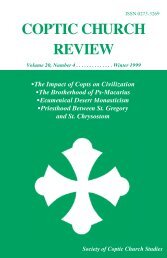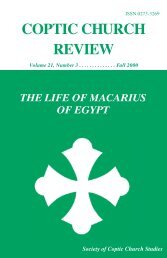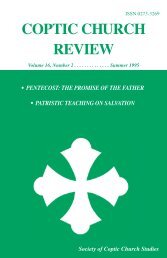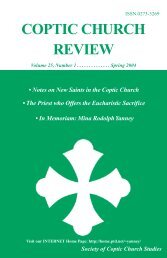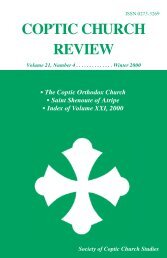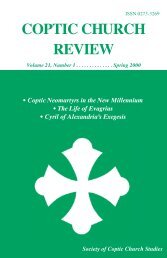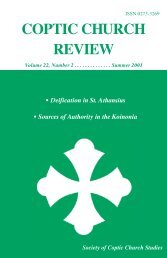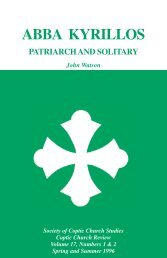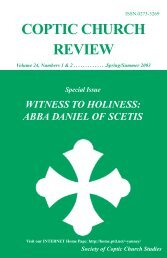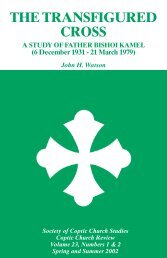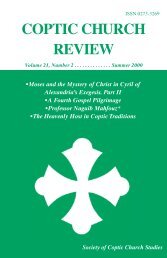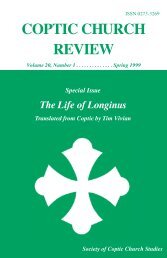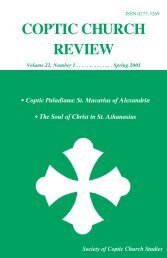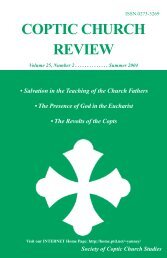2004 Fall.Vol25.#3.pdf - Coptic Church Review
2004 Fall.Vol25.#3.pdf - Coptic Church Review
2004 Fall.Vol25.#3.pdf - Coptic Church Review
You also want an ePaper? Increase the reach of your titles
YUMPU automatically turns print PDFs into web optimized ePapers that Google loves.
76 <strong>Fall</strong> <strong>2004</strong> • <strong>Coptic</strong> <strong>Church</strong> <strong>Review</strong> - Volume 25, Number 3<br />
St. Justin Martyr, the second-century Roman philosopher, compares the<br />
Eucharist to the Incarnation of our Lord, since in both cases the Divine has emptied<br />
himself (kenosis) and became subject to matter and time. He writes in his first<br />
Defense of Christianity, directed to the Emperor Antoninus Pius,<br />
For not as common bread and common drink do we receive<br />
these; but in like manner as Jesus Christ our Savior, having been<br />
made flesh by the Word of God, had both flesh and blood for our<br />
salvation, so likewise have we been taught that the food which is<br />
blessed by the prayer of His word, and from which our blood and<br />
flesh by transmutation are nourished, is the flesh and blood of<br />
that Jesus who was made flesh. 9<br />
Justin has written this in an open letter to the Emperor, which was read by all<br />
people including pagans who had heard various rumours about what happened in<br />
the Christian meetings. This was the first patristic writing after the gospels and the<br />
Didache to describe the Christian liturgy in any detail. From its beginning, the<br />
Christian <strong>Church</strong> has never considered the Eucharistic bread and wine as mere<br />
symbols or allegory, but rather the real Body and Blood of our Lord himself. This<br />
is the New Testament teaching as expressed by St. Paul in his first letter to the<br />
Corinthians, written in 62 AD, “The cup of blessing which we bless, is it not a participation<br />
in the blood of Christ? The bread which we break, is it not a participation<br />
in the body of Christ (1 Cor 10:16)?” “For anyone who eats and drinks without discerning<br />
the body eats and drinks judgment upon himself ” (1 Cor 11:29). All the<br />
evangelists, together with St. Paul, stress the words of Christ (after “he had given<br />
thanks”) (1 Cor 24), “This is my body . . . This is my blood” (1 Cor 11:23-25; Mt<br />
26:26-28; Mk 14:22; Lk 22:19, 20). The presence of the Lord in the Eucharist is<br />
not merely a spiritual presence but is a material presence essential for the redemption<br />
of man, soul and body.<br />
Man could have been saved by faith alone had he been only<br />
a soul, without body. But because of the material body the<br />
sacraments have been necessary as visible means that carry to<br />
humanity the invisible graces of God. The soul can be nourished<br />
by grace or by faith in God; but the body can have eternal<br />
life only by eating the body of Christ and drinking his<br />
blood (Jn 6:50-54). The Eucharist is an extension of the saving<br />
action of Christ in the Incarnation. Through it every member<br />
of Christ participates in his work of salvation—incarnation,<br />
9 First Apology of Justin 66 (ANF, volume 1)




